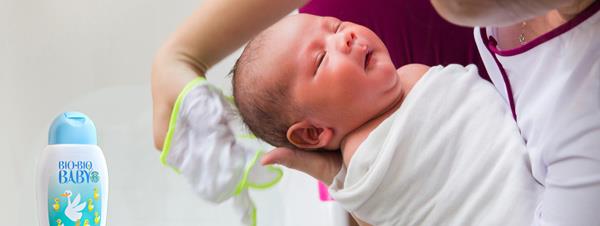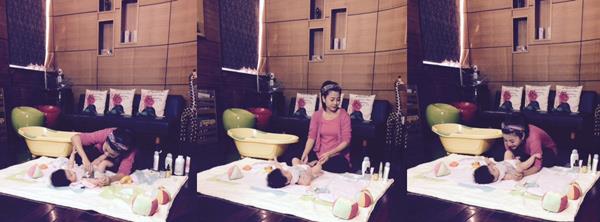Bathing a newborn who has not had its umbilical or already umbilical is an important part of first-mum life. Please refer to the detailed instructions below so that mothers can directly bathe their baby in the first days.
content
Step 1: Prepare before bathing your baby
Step 2: Instructions on how to safely bathe your newborn baby
Step 3: Take care of your baby's navel
Important notes for bathing babies
When is a good time to bathe the baby?
To bathe babies safely and thoroughly, mothers can follow the steps below.
Step 1: Prepare before bathing your baby
Bathroom: Bathroom must be airtight, the room temperature is about 24 degrees Celsius
Bathing utensils for babies
Towels for babies: mothers should prepare 1 small towel and 1 large towel (a small towel to bathe, a big towel to dry)
Prepare a bath for your baby: 2 pieces (one for bathing, one for rinsing after bathing)
Baby shower oil: only for babies, it is best to use organic shower oil - organic, no chemicals, no colorants and fragrance.
Sterile cotton swabs and cotton balls
Clothes or diapers
Suitable bath water temperature for babies: Warm water about 37 to 38 degrees (use a bath or hand to check)
Alcohol 70 degrees
Step 2: Instructions on how to safely bathe your newborn baby
Take off your baby's shirt and diaper gently
Wrap the towel in the area you haven't showered yet
Slowly put the baby into the brass. Hold the baby in the head position about 30 degrees higher than the legs, the baby's back resting on the mother's arm.
Use cotton balls to wipe eyes, nose, ears, face. Each cotton pad is used only once, do not reuse. If you do not use cotton, use a milk towel that does not produce cotton dust to avoid cotton dust remaining on the body.
Proceed to wash hair, rinse, dry head. Use a soft and small towel to wash your baby's hair, avoid using your hands because nails can hurt your baby.
Use baby shower gel to apply gently on the head and down to the baby's body, be careful not to let shower gel in the eyes will cause discomfort for the baby.
During the time your baby is not yet falling umbilical, avoid getting water into the navel will easily become infected.
Rinse the baby's head and body clean, then use a soft cloth to dry the baby's whole body, pay attention to wipe the genitals, need to wipe from front to back and then put on clothes or diapers for the baby.

Step 3: Take care of your baby's navel
Use alcohol to disinfect the umbilical cord
If the umbilical cord is not falling out, disinfect the umbilical cord from the base of the umbilical cord with a cotton swab.
Leave your belly button open, don't bandage your belly button. If your belly button hasn't fallen, wear a diaper under the navel.

Tell the mother how to clean the umbilical cord for a newborn It takes 3-7 days, or even nearly a month, the newborn baby's umbilical cord to dry and fall completely. During that time, the umbilical care for the baby is especially important, because only a small mistake, the risk of umbilical cord infection, umbilical cord infection is very high.
Important notes for bathing babies
When taking a bath, mothers avoid letting the water get the umbilical part wet, as usual, the umbilical cord will fall off by itself 1 to 3 weeks after giving birth, during this time mothers need to do their utmost safe and safe navel to avoid the umbilical case. infection.
When bathing the baby, the mother should sit comfortably on a small chair, about 40cm low, hold the baby on the left or right arm, the head is neatly in the mother's palm, and the back is on the arm, the baby's buttocks are on the person's lap mom.
Use a sterile cotton ball or cotton swab to clean the navel and each cotton ball or swab is for single use only.
After bathing, you need to use a dry towel, a soft cloth to wrap your baby to warm before putting on the diaper and shirt.
When is a good time to bathe the baby?
You just need to bathe your baby 1-3 times a week.
The best time for a mother to bathe her newborn is in the sun and when it is convenient for the mother. The specific and best times are 10 to 11 a.m. or 3 to 4 p.m. You can create a routine for your baby in the following sequence: bathing - breastfeeding - sleeping ...
Do not bathe your baby too long in water, the longest time is 4 to 5 minutes. When you are over 3 months old, you can bathe your baby up to 10 minutes so that the baby can get used to the water for longer.















